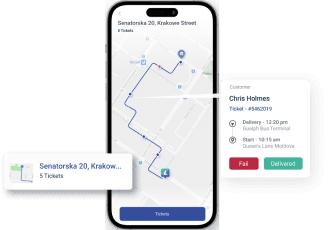TABLE OF CONTENTS

Sign-Up
Enter your email address
Companies use telematics to collect and share data from devices around the world. They study this data to improve efficiency in real time. This technology manages fleets, tracks vehicles, and monitors freight containers.
What is a telematics system?
A telematics definition describes a system that collects and transmits data using technology. It includes GPS, sensors, and communication tools. GPS tracks the location of assets or vehicles. Sensors monitor various conditions like engine health or fuel use.
Communication tools send data in real time. Fleet managers use the system to track performance and efficiency. Insurance companies analyze driving habits through telematics. Logistics firms optimize routes based on data. Telematics systems help improve safety, reduce costs, and boost overall efficiency.
How does telematics work?
Telematics systems connect a device like advanced GPS tracking solutions to an asset. This device collects the performance of the data about the asset. After collecting the data the device sends it to a data center. The data center then organizes and analyzes the information.
The telematics system stores this data in a database. The fleet management system can access this database. The telematics system may store the database on a cloud server or a company’s internal server.
Once the data is uploaded the fleet manager uses the telematics system’s software to access it. The software’s features may vary based on the specific telematics solution.
What is telematics in a car?
A telematics device in a car is a small black box with a GPS receiver. It collects data about the car’s location, performance, and condition. This data is sent wirelessly to other systems or devices. The software then uses this data to help manage and improve the car’s performance. The device also connects to the car’s system to give updates and alerts about driving and vehicle status.
Benefits of Telematics Systems
There are several benefits of telematics systems such as:
Boost Fleet Efficiency
Telematics systems optimize your vehicle routes. They help you save time and fuel by avoiding traffic and delays. This leads to timely deliveries and satisfied customers. Efficient operations also reduce wear and tear on vehicles.
Set Geofencing Boundaries
Telematics systems allow you to create virtual boundaries around important areas. You get an immediate alert when a vehicle exits these boundaries. This feature helps monitor vehicle movements and prevent unauthorized use. It also protects against theft by quickly detecting unusual activity.
Monitor Driver Behaviour
Telematics systems track how drivers handle vehicles on the road. You can identify risky behaviors like speeding or harsh braking. You improve safety for drivers and cargo by addressing these issues. Safe driving reduces accidents and related costs. Recognizing good drivers also boosts morale and performance.
Prevent Vehicle Theft
Telematics systems let you track all your vehicles. If a vehicle is stolen, Telematics and GPS tracking help you to recover it faster. This lowers the chance of losing valuable assets. Quick recovery minimizes disruptions to your business. Investing in telematics protects your fleet from theft and saves you money.
Reduce Fuel Waste
These systems monitor idle time and inefficient driving. They identify where fuel is wasted and addressing these issues lowers fuel costs. Efficient fuel use reduces emissions and benefits the environment. Over time, these savings add up significantly.
Improve Maintenance Schedules
It provides real-time data on vehicle health. You get alerts when maintenance is needed. Addressing small issues early prevents major breakdowns. This keeps your vehicles on the road and avoids costly repairs. Regular maintenance also extends the lifespan of your fleet.
Enhance Customer Satisfaction
It offers real-time tracking of deliveries. Customers can receive updates on the status of their orders. This transparency builds trust and satisfaction. You can inform customers promptly in case of delays. Happy customers are more likely to return and recommend your services.
Lower Insurance Costs
Many insurance providers offer discounts for using telematics. The data from these systems shows that your fleet is safe and well-managed. This reduces the risk for insurers, leading to lower premiums. Over time, these savings can be substantial. Using telematics can make your insurance more affordable.
Which Industries Are Using Telematics?
Telematics is used in many industries and keeps expanding. Here’s a look at how different industries benefit from telematics.
Government: Enhances snow management, trash collection, and street cleaning.
Heavy Equipment: Maintains equipment fleets and prevents theft.
Public Safety: Tracks emergency vehicles for faster respone and safety.
Truck Fleets: Ensures safe and timely delivery of shipments.
Construction: Monitors performance, fuel use, and maintenance.
Oil & Gas: Increases efficiency and safety in extraction and transport.
Refrigeration: Monitors temperatures to prevent spoilage.
Service Providers: Tracks vehicles for companies like internet or electric providers.
Executive Fleets: Prevents luxury vehicle breakdowns with better maintenance.
Conclusion
Telematics enhances business operations by collecting vital data. Telematics in fleet management tracks GPS locations, vehicle performance, and environmental conditions. This information helps optimize fleet tracking and improve route planning. It also enables timely maintenance and better cost control.
Businesses can monitor driver behavior and ensure vehicles run efficiently. Telematics supports effective decision-making and boosts overall productivity. Companies benefit from reduced downtime and improved service quality. It also helps in managing resources and minimizing operational costs.

Aiden mitchell
As a GPS Tech geek, I find Lumyri's transformative impact on GPS technology on businesses and their customers. Real-time tracking information empowers businesses to provide accurate delivery estimates, allowing customers to plan their schedules with precision.



